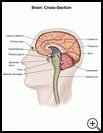
Pituitary Gland Tumor
________________________________________________________________________
KEY POINTS
- A pituitary gland tumor is an abnormal growth of cells in your pituitary gland. This gland is located at the base of your brain and makes many different hormones.
- Treatment may include radiation therapy or chemotherapy, hormone medication, or surgery.
- Follow the full course of treatment prescribed by your healthcare provider. Don’t stop taking your medicine or change the way you take it unless your provider tells you to.
________________________________________________________________________
What is a pituitary gland tumor?
A pituitary gland tumor is an abnormal growth of cells in your pituitary gland. This gland is located at the base of your brain. It is about the size of a pea. It makes many different hormones. Hormones are chemicals made in the body that help with many functions, such as growth, development, sexuality, and keeping blood pressure and blood glucose under control.
Hormones that are made by your pituitary gland affect:
- Growth of your body
- Your thyroid gland
- Your body’s response to stress, such as changes in your blood pressure or blood glucose levels
- Your immune system (the immune system is your body's defense against infection)
- Your body temperature and heart rate
- Your appetite, digestion, and turning food into energy
- The balance of salt, water, and other chemicals in your body
- How your sexual organs develop and function
A pituitary tumor causes your pituitary gland to make too much or too little hormone.
Most pituitary tumors are benign (not cancer). Benign tumors can grow and cause problems if they are not treated, but they do not spread to other parts of your body as cancer does.
What is the cause?
The exact cause of pituitary tumors is not known. There are no known risk factors for pituitary tumors. Some tumors may be caused by genes you inherited from your parents. Genes contain the information that tells your body how to develop and work.
What are the symptoms?
The symptoms depend on:
- Which hormones are affected by the tumor
- Whether your body is making too many or too few hormones
- Whether other parts of your body that make hormones are affected by the pituitary tumor
Symptoms may include:
- Changes in your weight
- Constipation or diarrhea
- Changes in how you tolerate temperature, such as feeling cold or hot all the time
- Delayed growth or unusual growth
- Changes in your energy level, such as feeling tired all the time Changes in body hair
- Changes in your sex drive
- If you are a woman, irregular periods, problems getting pregnant, or leakage of milk from your breasts even though you are not breast-feeding
- If you are a man, smaller testicles or trouble having or keeping an erection
- Changes in your vision
As a tumor grows, it may press against other parts of your brain. This can cause other symptoms, such as headaches or vision problems.
How is it diagnosed?
Your healthcare provider will ask about your symptoms and medical history and examine you. Tests may include:
- Blood and urine tests
- X-rays
- CT scan, which uses X-rays and a computer to show detailed pictures of the brain
- MRI, which uses a strong magnetic field and radio waves to show detailed pictures of the brain
How is it treated?
The treatment depends on the type of tumor and the problems it is causing. Possible treatments are:
- Radiation therapy, which uses high-energy X-rays to kill tumor cells
- Chemotherapy (anticancer drugs), which uses medicine to kill tumor cells
- Hormone therapy, which may use medicine to stop hormones in your body from helping tumors grow or may replace hormones that your body is not making
- Surgery to remove the tumor. If you have surgery to remove a tumor, you may need to take replacement hormone medicine for the rest of your life.
How can I help take care of myself?
Follow the full course of treatment prescribed by your healthcare provider. Don’t stop taking your medicine or change the way you take it unless your provider tells you to.
Keep all appointments for tests. The tests can help make sure you are getting the right amount of medicine.
Ask your healthcare provider:
- How and when you will get your test results
- How long it will take to recover
- If there are activities you should avoid and when you can return to your normal activities
- How to take care of yourself at home
- What symptoms or problems you should watch for and what to do if you have them
Make sure you know when you should come back for a checkup. Keep all appointments for provider visits or tests.
You can get more information from:
- The Hormone Foundation
800-467-6663
http://www.hormone.org - The Pituitary Network Association
805-499-9973
http://pituitary.org/

